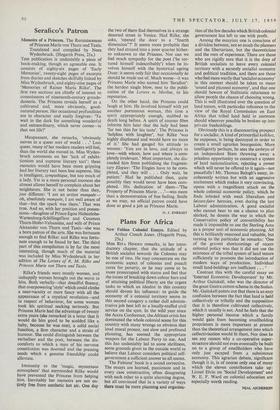Plans For Africa
Miss RITA HINDEN remarks, in her intro- ductory chapter, that the attitude of a British socialist towards the Colonies may be one of two. He may concentrate on the economic aspect of colonies and preach cures for poverty, or he may come to be more preoccupied with status and feel that the issues of breaking down colour bars and of attaining political liberty are the urgent tasks to which an idealist in this country should devote his influence: to guide the economy of a colonial territory seems to this second category a rather dull adminis- trative job best left to a locally-staffed civil service on the spot. In the wild year since the Accra Conference, the.African crisis has dominated the whole colonial scene for this country with many wrongs so obvious that loud moral protest, not slow and profound planning, has seemed the appropriate weapon for the Labour Party to use. And this has undeniably led to some shrillness, some grounds given to the outside world to believe that Labour considers political self- government a sufficient answer to all unrest.
The Fabians' book is a sound corrective. The essays are learned, passionate and in every case constructive, often disagreeing with each other to a quite alarming degree, but all convinced that in a variety of ways there must be more planning and organisa-
tion of the few decades which British colonial government has left to use with profit.
Among the essayists one is conscious of a division between, not so much the planners and the libertarians, but the theoreticians and the men of experience. There are those who are rigidly sure that it is the duty of British socialists to leave every colonial territory with a securely socialist economy and political tradition, and there are those who feel more warily that 'socialist economy' in this context should be taken to mean `sound and planned economy', and that one should beware of Stalinistic reluctance to allow people the chance of choosing wrong. This is well illustrated over the question of land tenure, with particular reference to the view of the Royal Commission on East Africa that tribal land held in common should wherever possible be broken up into private freeholdings.
Obviously this is a disconcerting prospect for a socialist. A kind of primordial kolkhoz, he supposes, is being destroyed in order to create a small agrarian bourgeoisie. More intelligently perhaps, he sees the embryo of an independent State throwing away a priceless opportunity to construct a system of land nationalisation, rejecting a power which will never be offered to it again—not peacefully! Mr. Thomas Balogh's essay, in- coherently written but with an aggressive excitement which makes it very convincing, opens with a magnificent attack on the whole colonial economic policy, which he finds infested with weak liberalism and laissez-faire heresies, even during the last Labour administration. A good socialist who cannot bear to see a chance to plan shirked, he detests the way in which the Conservative policy of convertibility has made it impossible to use the Sterling Area as a proper unit of economic planning. All this is brilliantly reasoned and valuable, but turning to the particular he remarks: 'One of the gravest shortcomings of recent colonial policy was that it did not use the existence of the tribal system of land tenure sufficiently to promote the introduction of modern ways of production. Individual small land-holdings are inefficient . . . '
Contrast this with the careful essay on `Internal Economic Development' by Mr. Arthur Gaitskell, who was the director of the great Gezira cotton scheme in the Sudan. Mr. Gaitskell points out that there is an easy confusion between the fact that land is held collectively or tribally and the supposition that it is therefore cultivated collectively, which it usually is not. And he feels that the higher personal income which a family would gain from becoming smallholding proprietors is more important at present than the theoretical arrangement into which collectivisation would fit them. Nor does he see any reason why a co-operative super- structure should not even eventually be built on to a group of smallholders who have only just escaped from a subsistence economy. This agrarian debate, significant though it is, is of course only one of many which the eleven contributors take up: Lionel Elvin on 'Social Development' and W. E. F. Ward on colonial education are especially worth reading.
NEAL ASCHERSON






































 Previous page
Previous page